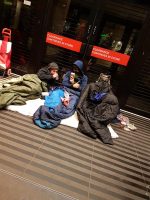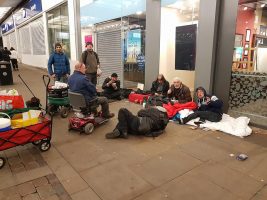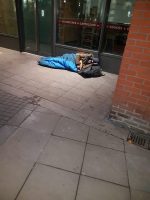A MANCHESTER homeless campaigner has spoken out about increased assessments and paperwork in the new Homelessness Reduction Act.

The changes to the Homelessness Reduction Act, which came into effect at the beginning of April, will now try to reduce homelessness by offering more advice and information about the prevention of homelessness, along with further assessment criteria and detailed personalised housing plans.
It also extends the period ‘threatened with homelessness’ from 28 days to 56 to allow people more time to secure help.
Incognito Manchester is a homeless outreach programme providing food and drinks to aid those on the streets.
Paul Hickey, 37, from Salford is a member of Incognito Manchester and said: “As a group, we are concerned with the immediate well-being of people sleeping rough and the homeless, as well as people who have homes but are not coping.”
In 2017, Manchester had the highest number of rough sleepers in the North West, almost three times more than Liverpool.
Mr Hickey, whose views are not representative of Incognito Manchester, explains his personal opinion towards the Homelessness Reduction Act.
He said: “I have been working on outreach groups in Manchester for five years and I haven’t seen the numbers of rough sleepers and homeless drop off in that time.
“The council keep putting up their posters about ending homelessness year after year, but the problems stay the same.”
Mr Hickey believes that the act has too many criteria to be beneficial to those in need.

He said: “As I understand it, many homeless are not capable of maintaining the paperwork and of keeping the appointments necessary to benefit from the act.
“Many people cannot cope with being indoors after having lived out for long periods.
“They want places they can access as and when required, even on a night by night basis; safe and secure accommodation.”
In October 2017, a Social Impact Bond (SIB) with £1.8 million of new funding was introduced to Manchester to help provide such accommodation along with intensive health support.
Andy Burnham, Mayor of Greater Manchester introduces SIB in October 2017:
Mr Hickey believes that it is this continued support that is needed in Manchester.
Mr Hickey said: “SIBs seem like a good idea, with the recipients getting continued support to help them stay off the streets but I know how hard it can be for some people to manage themselves and I have seen people lose accommodation time after time because they cannot cope.”
Rick Henderson is the Chief Executive of Homeless Link, a national membership charity for organisations working directly with people who become homeless in England.
Mr Henderson said: “We welcome the Homelessness Reduction Act, which should ensure that more people have their homelessness prevented.
“However, structural factors including a lack of affordable housing and welfare reform continue to drive an increase in homelessness and rough sleeping, which is putting pressure on homeless services.

“Homelessness accommodation projects, supported housing schemes and other voluntary sector services offer vital support, and it will be crucial that they receive adequate funding from the government on an ongoing basis, to enable vulnerable people to move away from homelessness for good.”
Data information is sourced from homeless.org.uk.
All images, including the featured image, are used with permission from Paul Hickey from Incognito Manchester.
For more news, sports and travel information, visit Quays News.














Recent Comments